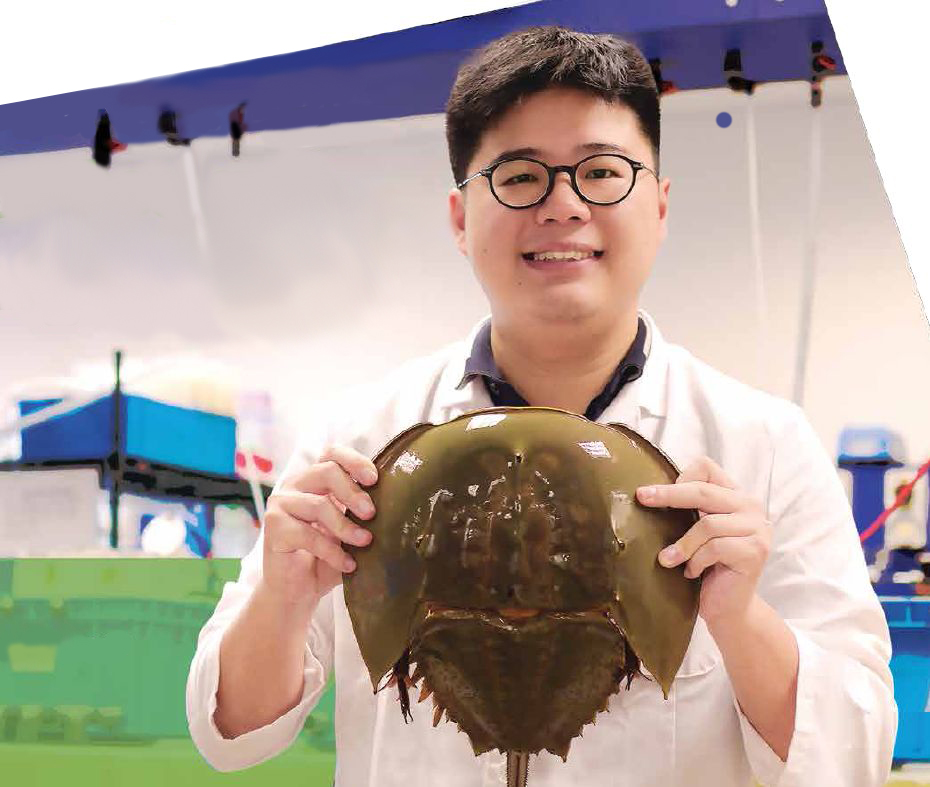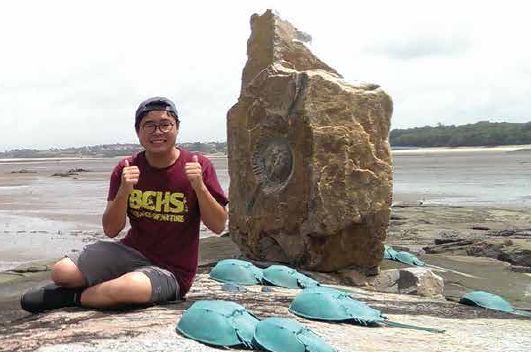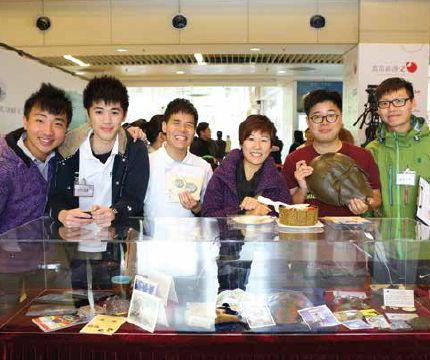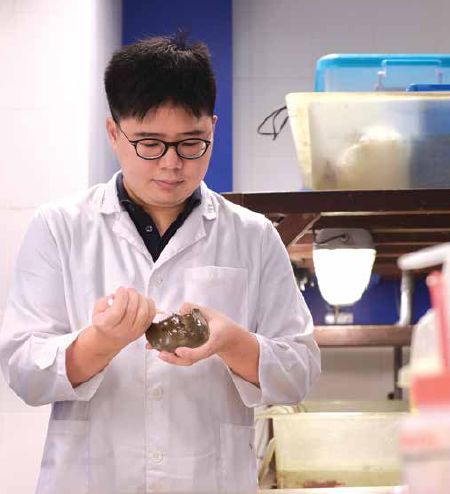The horseshoe crab, a member of the limulidae family, has a history dating back around 400 million years. However, in recent years, rapid habitat change and major pollution issues from urban development have brought a critical decline in the global population of these marine arthropods. Only around 10,000 juvenile horseshoe crabs now survive in Hong Kong waters.
One champion out to save the species and hopefully increase its numbers again is alumnus Dr Billy Kwan Kit-yue. Dr Kwan, originally from Malaysia, has been passionate about environmental matters from an early age. He first came to understand the crisis facing the horseshoe crab, and its significance to people after winning a CityU scholarship and achieving his dream to study at an overseas university. During his BSc in Environmental Science and Management, Dr Kwan got to know former CityU Professor Paul Shin Kam-shing, a renowned expert in seabed ecology and marine life, and heard about horseshoe crabs and their priceless contribution to medicine for the first time – their unique blue blood can be used to detect whether medical equipment and medications have been infected by bacteria. On learning about this, Dr Kwan decided to continue on to a PhD in Biology and Chemistry at CityU to assist in the horseshoe crab conservation.
Saving the horseshoe crab
Such work involves him in both education and research. Since 2009, Dr Kwan’s team has received funding from the Ocean Park Conservation Foundation Hong Kong to run horseshoe crab seminars in 30 secondary schools every year and engage students in rearing juvenile crabs. In this way, the researchers have discovered more about the invertebrates’ culture process. Meanwhile, comparative studies of wild horseshoe crabs and those bred artificially have shed light on the most appropriate conditions to release the latter into the sea and optimise their chances of survival.
“CityU is one of the pioneers in Hong Kong to undertake conservation studies on horseshoe crabs,” Dr Kwan said. “Through different types of research and experiments, we will eventually understand more about their biology and ecology. In addition, our work has inspired other education institutions to initiate horseshoe crab research that will hopefully lead to greater protection of scarce and valuable underwater lifeforms.”
Promoting greener living
Dr Kwan does not only encourage eco-friendly practices through his studies. As a CityU Residence Tutor, for example, he sought to encourage greener living among students in hostel. “On an academic exchange to Finland, I noticed that students there used many second-hand items. There were even supply rooms to help them find bed sheets, linen, and other daily necessities.” He believes local students could easily adopt a recycling mindset as well. “Practising a greener lifestyle is simple,” he pointed out. “The most direct way is to start with everyday life, for example, by limiting your use of plastic bottles, bags and other non-degradable objects.”
Future moves
To spread the word about protecting the horseshoe crab, Dr Kwan is taking up a post at Guangxi Province’s Qinzhou University, close to Beibu Gulf, an all-important horseshoe crab habitat. While there, he will pursue his conservation and research work into the fascinating creatures. “I hope to share the expertise I have gained at CityU so that people in other places can understand the importance of marine life conservation,” he said.
醉心守「鱟」
校友訪問 – 關傑耀博士
已有四億年歷史的馬蹄蟹,又稱「鱟」(粵音「候」),礙於環境的急速變化,以及城市發展所導致的污染問題,牠們在全球的數目不斷下降,香港現時更只剩下不足一萬隻幼兒。
來自馬來西亞的關傑耀博士自少對環境科學有著濃厚興趣,獲得香港城市大學的獎學金後,出國升學的理想得到實現。他在城大就讀環境科學與管理榮譽學士課程期間,他問學於海床生物專家單錦城教授,首次接觸馬蹄蟹。牠們的外表雖然不討好,但其藍血可提煉試劑,有助測試醫學儀器及藥物有否受到細菌感染,具珍貴的醫療價值。關博士了解到保育馬蹄蟹的重要性後,決定於城大繼續攻讀生物及化學系博士學位,並加入守「鱟」的工作。
保護馬蹄蟹
馬蹄蟹的保育工作主要分為教育及科研兩方面。自2009年起,關博士的團隊獲得「香港海洋公園保育基金」的資助而成立「馬蹄蟹校園保母計劃」。按此計劃,研究團隊每年會在三十間中學舉辦關於馬蹄蟹的講座,並讓學生參與培育工作。此外,研究團隊也會透過飼養馬蹄蟹以了解其生活習性,並對比野生馬蹄蟹及人工飼養馬蹄蟹的身體狀況,研究其適合放生的條件,以增加馬蹄蟹的存活機會。
關博士告訴我們:「城大是全港其中一間率先進行馬蹄蟹的保育研究的大學,透過各種科研及實驗,有助我們全面了解馬蹄蟹的習性。」他並表示:「我們的保育工作亦推動了其他學院開始進行相關的保育研究, 希望藉此可以令更多珍稀海洋生物得以保護。」
推動綠色生活
除科研外,關博士亦曾擔任城大宿舍導師,致力鼓勵綠色生活。他憶述:「我曾經到芬蘭作學術交流,於寄宿期間發現當地學生大部份的寄宿用品都是二手的,校內甚至設有儲物室以便擺放各類型的日用品,例如床單、被鋪等。」他提倡學生循環再用各種日用品,他一針見血地說:「實踐綠色生活其實很簡單!最直接的做法,就是從日常生活開始,減少使用不能自然分解的物件如膠樽和膠袋。」
未來動向
廣西省的北部灣是馬蹄蟹的重要棲息地。關博士會到當地的欽州學院任教,並繼續進一步進行馬蹄蟹的保育和科研工作。他滿懷信心地說:「我希望將在城大學懂的科研知識帶出香港,讓不同地方的人都能了解保護海洋生物的重要性。」
Dr Billy Kwan Kit-yue
BSc in Environmental Science and Management
PhD in Biology and Chemistry
關傑耀博士
環境科學與管理榮譽學士
生物及化學系博士
Dr Kwan studying the local habitat of horseshoe crabs in Kinmen.
關博士到金門考察當地馬蹄蟹的棲息地。
Dr Kwan (second right) attends an educational event in Tin Shui Wai with partners from the Ocean Park Conversation Foundation Hong Kong.
關博士(右二)與香港海洋公園保育基金伙伴一同出席天水圍的教育活動。
Daily health check: Dr Kwan extracts horseshoe crab blood in CityU laboratory.
關博士在城大實驗室為馬蹄蟹作日常抽血檢查確保牠們健康。





